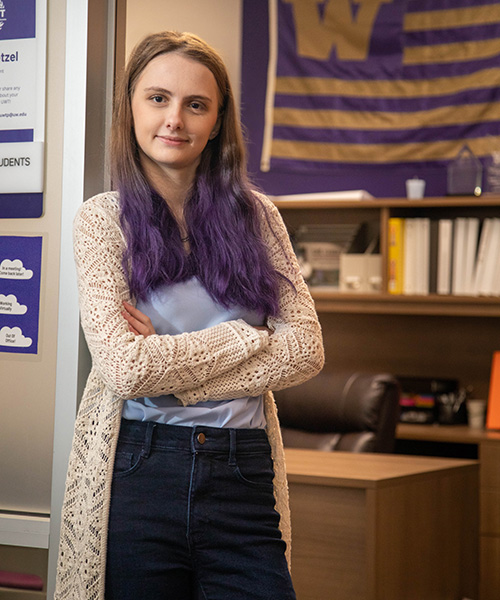
Leader in the Making
ASUWT President Holly Wetzel credits her experience at UW Tacoma for her personal transformation
Colleges and universities talk a lot about the transformative power of higher education. A degree can open doors and lead people down a new path. That’s the end result, but the process of earning a degree, what we call the college experience — learning, making friends, joining a club, participating in research, doing an internship — is where the transformation happens.
Personal transformation is a bit of a misnomer. Sure, an individual does the changing or evolving, but most people don’t wake up one day and decide, for no reason other than they feel like it, that they are going to be different. Chances are those folks are reacting to something or someone. They may have the desire to grow, but are in a need of help getting started.
Holly Wetzel came to UW Tacoma in the fall of 2020. The Holly Wetzel of today shares the same name and looks essentially like her former self, but that’s where the similarities end. “I had some leadership qualities before coming to UW Tacoma, but they weren’t fully developed,” she said. “I also had issues with self-confidence.”

The UW Tacoma senior recently began her year-long term as ASUWT President. How is it that Wetzel, who in her own words thought, “I was going to be the person who would just came to campus, go to class, and immediately go home,” decided to run for a position that puts her at the center of campus life? How is it that she went from “having issues with myself” to someone who “childhood-me would be inspired by and incredibly proud of”?
Born in California, Wetzel moved with her family to Oregon and then eventually to Olympia, Washington. The oldest of two siblings, Wetzel attended Olympia High School. While in high school she also took college courses at South Puget Sound Community College (SPSCC) through the Running Start program.
Wetzel transferred to UW Tacoma after completing her associate’s degree at SPSCC. “I wanted a UW education,” she said. “I also wanted something that was close to home plus the small class sizes were incredibly appealing.”
Wetzel started her UW Tacoma career during a period of flux for the campus and for higher education in general. The COVID-19 pandemic forced a lot of colleges and universities to switch to online instruction in the winter and spring of 2020. Wetzel’s first UW Tacoma classes took place online. The experience came with challenges, but it also prepared Wetzel.
Around the same time she started at UW Tacoma, Wetzel took a position with Providence St. Peter Hospital in Olympia. “I worked there as a patient transporter,” she said. A transporter helps hospital patients get around the facility and takes them where they need to go including to the lab or to get x-rays. “I got to see a lot, especially in the realm of mental health and how that impacted patients,” said Wetzel. “It wasn’t uncommon to have patients just unload their worries and traumas onto me as I was transporting them.”
There’s a point where Wetzel’s work life and her school life intersect and begin to play off of each other. When it came to majors, Wetzel wasn’t sure what she wanted to do. “I changed my majors a bit,” she said. She ultimately chose to double major in psychology and healthcare leadership.
The choice of majors reflects Wetzel’s work at Providence and her time at the Crisis Clinic of Thurston and Mason Counties (CCTMC), a 24-hour crisis hotline. “Working at the hospital during the pandemic left me feeling like I wanted to do more for people in my community who were struggling with mental health,” she said. Wetzel started volunteering at the clinic in April of 2022. “As I volunteered on the phones, I really found myself enjoying nonprofit and volunteer work,” she said.
Wetzel got hired on at the clinic in September of that year (she works part-time at the clinic and part time at Providence). Before switching to psychology and healthcare leadership, Wetzel majored in computer science. Her facility with technology and her experience with online learning proved valuable to her work at CCTMC. “I brought the idea to the executive director about transitioning our training curriculum to an online, asynchronous module-based curriculum,” said Wetzel. “She, as well as the board of directors, were completely on-board and let me take charge and make it a reality. The asynchronous training platform and curriculum in combination with the in-person training sessions turned out to be a huge success and new volunteers found it extremely helpful.”
Wetzel’s experience in the classroom helped in other ways. “There were a lot of classes I’d already taken that were incredibly relevant to the crisis intervention work we do at the hotline,” she said. “The psychology courses were a kind of backbone and enabled me to do additional research that ultimately informed the curriculum.”
Community is important to Wetzel. Creating and maintaining community became hard to do during the height of the pandemic. Wetzel found a way to do it. “The campus didn’t have a good understanding of what Discord was, they had a server but made it difficult for students to get involved there,” she said.
Wetzel decided to create a separate server for UW Tacoma students. “It went really well and it’s still growing strong,” she said. “We have almost 700 students in the channel which is about 15% of the student population.”
Wetzel’s efforts attracted the attention of then-Director of Student Involvement & Leadership Elizabeth Hansen. “She [Hansen] really liked what I was doing,” said Wetzel. “She became a mentor to me and helped me grow as a person.”
Hansen encouraged Wetzel to get involved with ASUWT. “I decided to run to be the director of outreach,” said Wetzel. “I won, which I consider to be sheer luck.”
Luck or not, Wetzel continued on her mission to build community. “As director I got to plan all kinds of cool events, including ‘Rock the Vote’ which brought live music to campus,” she said.
Wetzel’s interest in mental health lead her to UW Tacoma’s Health Promotion Specialist & Campus-Based Confidential Advocate, Madie Brown. “She’s [Brown] has been an amazing mentor and I’ve learned so much from her,” said Wetzel.
The pair began discussing ways to address the health — mental, physical, emotional — needs of UW Tacoma students. “We needed data,” said Wetzel. “There’s this tool called the National College Health Assessment that has questions on it about food insecurity, mental health, belonging, etc.” Brown and Wetzel organized a messaging campaign to get the word out about the survey to students.
Wetzel plans to use the data collected in her role as ASUWT President. “I’m really focused on student health and wellness, as well as student safety,” she said. “That data will inform the initiatives we focus on in the coming year.”
While she may be focused on the year ahead, Wetzel has an idea of what she wants to do long-term. “I’d like to be an executive director of a nonprofit or maybe even start my own,” she said. “That may involve getting my master’s degree.”
The twenty-something would also like to be a “castaway” on the long running CBS reality-show Survivor. The show’s premise is that a group of “castaways” is marooned on an island or an isolated location and have to provide for themselves while avoiding being voted off by their fellow castaways. “I love the show,” said Wetzel. “I see it as a way to challenge myself.”
There’s a theme connecting Wetzel’s interest in Survivor and the transformation she’s undergone at UW Tacoma. “If I think about myself a couple of years ago, I was incredibly shy,” she said. “The staff and faculty here allowed me to grow.”
Wetzel may have needed a little help getting her transformation started, but she’s got it now. “To be on that show, I’d be challenging myself and seeing just how far I’ve come and how much farther I can push myself,” she said.



